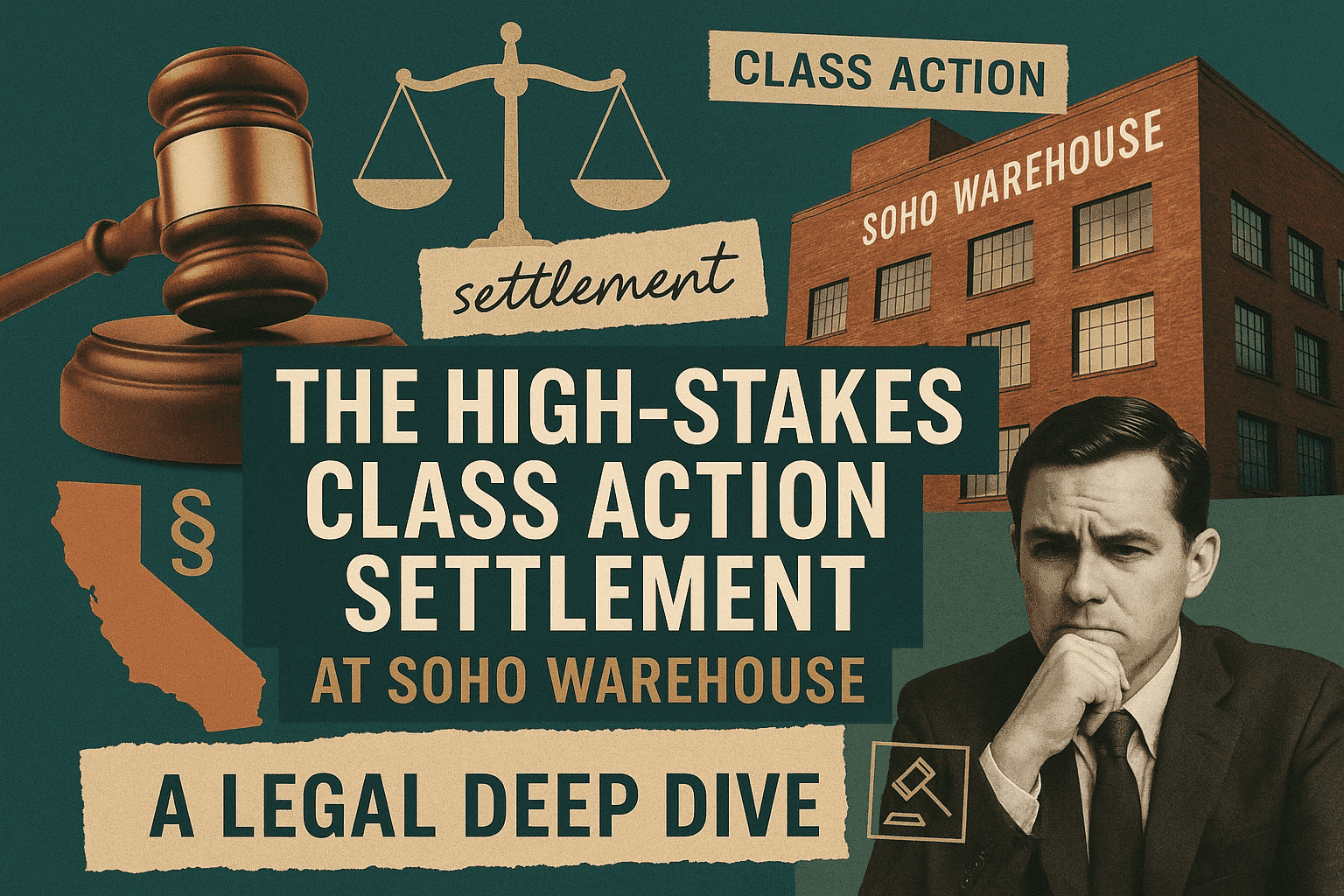The High-Stakes Class Action Settlement at Soho Warehouse: A Legal Deep Dive
Explore the intricate legal battle of Danielle C. Deras v. Soho House LLC, a landmark case highlighting employment liability and settlement strategies in California's complex labor landscape. Discover how Soho House & Co Inc. navigated this high-stakes class action lawsuit.

The LA Wage War: Unpacking the High-Stakes Class Action Settlement at Soho Warehouse
A Soho House Insider Legal Editorial
California—with its complex labor codes and highly active plaintiff's bar—has always represented a significant source of operational risk for the Group. The case of Danielle C. Deras v. Soho House LLC et al, filed first in state court and subsequently removed to federal court in April 2024, provides a vivid snapshot of how Soho House & Co Inc. (SHCO) manages massive potential employment liability, culminating in a sophisticated settlement agreement.
This action, identified under the Nature of Suit code 442 Civil Rights - Employment (often encompassing significant wage, hour, and discrimination claims in California), forced the entire corporate machine into action against claims that struck at the heart of our operations in Los Angeles.
The Defendants: The Entire West Coast Infrastructure
The lawsuit targeted nearly every major entity in the Soho House structure relevant to its California presence, demonstrating the breadth of exposure SHCO faces in the U.S. market. Named Defendants included:
- Soho House West Hollywood LLC
- Soho House LLC
- Soho House Holdings Limited (the primary operating subsidiary in Jersey)
- Soho House & Co. (the main public entity)
- Soho Warehouse DTLA
- Soho House Los Angeles, LLC
- LA 1000 Santa Fe, LLC
This comprehensive list, collectively referred to in the docket as the "Soho House Defendants", shows a deliberate effort by the plaintiff to pierce the corporate veil and maximize accountability across the Group's assets, from the flagship Houses to the global holding structure. [1]
The Legal Manoeuvres: CAFA and Arbitration
The lawsuit was initially filed in the Los Angeles Superior Court (Case #: 23STCV28551) but was immediately removed to the California Central District Court by the Soho House entities under the Class Action Fairness Act (CAFA) jurisdiction. Removing the case to federal court, a common defense strategy in high-stakes class actions, requires the defendants to assert that the amount in controversy and class size meet federal thresholds. The Soho House Clubs successfully demonstrated that the amount in controversy exceeded $5,000,000 and that the class size met the required criteria, thereby justifying the federal court's jurisdiction under CAFA.
The Soho House defense team [2], represented by Dentons US LLP, immediately went on the offensive, filing several crucial motions:
- Motion to Dismiss: Challenging the legal sufficiency of the complaint. This motion was initially granted, allowing the plaintiff 30 days to amend the complaint.
- Motion to Compel Arbitration [2]: Attempting to shunt the dispute out of public court and into private arbitration, a preferred method for employers to handle class-based claims. However, the initial motion was denied as moot.
Plaintiff Danielle C [2]. Deras fought back with a Motion for Remand, arguing the case should be sent back to state court. The federal judge, Judge Andre Birotte Jr., denied the Plaintiff's Motion for Remand in June 2024, confirming the federal court maintained jurisdiction. While the initial Motion [2] [2] to Compel Arbitration was denied as moot at that time, the Court granted the Motion to Dismiss, but granted the Plaintiff 30 days leave to amend the complaint.
Plaintiff Deras subsequently [2] filed a Second Amended Complaint, triggering renewed motions from the Soho House Defendants, including a second Motion to Compel Arbitration and a Partial Motion to Dismiss the updated complaint. [2]
The Resolution: A Quiet Dismissal with Prejudice
The case was ultimately resolved before any final ruling was made on the merits of the employment claims or the second attempt to compel arbitration.
- On October 8, 2024, a stipulated settlement was reached, leading the Court to vacate all impending motions and deadlines.
- The agreement [3] culminated in an Order Granting Stipulation of Dismissal on November 4, 2024. The entire action was dismissed with prejudice as to all Soho House Defendants, with each party bearing its own attorney's fees and costs.
While the financial [3] specifics of the settlement are not disclosed in these public documents, the resolution confirms that SHCO prioritized a decisive, system-wide settlement to resolve claims against its numerous operating entities. This clean break—dismissal with prejudice—eliminates the risk of this specific class action returning to challenge the Group's labor practices in court, allowing the Soho House Group to focus on its operational efficiency goals.
Furthermore, this case has an interesting collateral legacy: In subsequent litigation against Soho House entities (Correa v. SHCO), the Group successfully used evidence (the Declaration of Philip Spee, Regional Director of Operations-West Coast) gathered during the Deras case to confirm the non-California citizenship of its primary LLCs (which are ultimately owned by Soho House U.S. Corporation, a Delaware and New York citizen). This strategic deployment [4] of corporate structure information from one employment suit demonstrates the meticulous legal groundwork SHCO performs to defend itself across multiple pending U.S. labor disputes.
References
Legal Disclaimer
The information in this article/post is provided for educational, commentary, and criticism purposes only, drawing from publicly available sources under fair use principles. No intentional effort has been made to infringe trademarks, cause confusion, or exploit Soho House's goodwill for commercial gain. This site is non-commercial and operated in good faith as an independent resource. If you believe any content is inaccurate, infringing, or otherwise disputed, please contact us via the contact form for prompt review and potential resolution. We are not affiliated with Soho House.